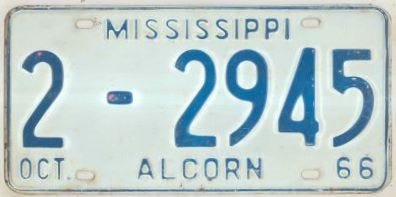Why Car Tags Are Expensive in Mississippi?
Mississippi is known for having high car tag costs compared to other states, leaving many residents wondering why these fees are so significant. Car tags, or vehicle registration fees, are used for maintaining roadways, funding schools, and supporting county budgets, but the way these fees are calculated in Mississippi can make them particularly steep. Several factors contribute to the high cost, including vehicle valuation, tax structures, and the allocation of funds to various public services.
Vehicle Value as a Primary Factor
In Mississippi, one major reason car tags are expensive is that the registration fee is based on the assessed value of the vehicle. The state uses a percentage of the vehicle’s “ad valorem” value, or fair market value as determined by the state, to decide how much residents must pay. Newer or more expensive cars will have higher registration costs, while older vehicles tend to have lower fees. This differs from some other states, where a flat fee is charged regardless of a car’s value, making Mississippi’s approach unique and sometimes costly. For example, a recent model car worth $30,000 will generate a significantly higher fee than an older car valued at $5,000.
Property and Privilege Taxes Combined
The Mississippi car tag cost includes both a property tax and a privilege tax. The property tax portion goes to the county where the vehicle is registered and helps support various public services, including roads and bridges, schools, and emergency services. The privilege tax is essentially a fee for the privilege of operating a vehicle on Mississippi roads. This combination means that vehicle owners in Mississippi pay a compounded cost when registering their cars, a structure that is designed to support infrastructure and community needs. However, it can feel burdensome because both taxes add up quickly, especially on higher-value vehicles.
Support for Local Schools and County Budgets
A significant portion of the revenue collected from car tags goes to fund local schools, which rely heavily on property tax income. In Mississippi, this revenue helps cover teacher salaries, school maintenance, and educational programs, but the largest part of these taxes fund school administration not direct classroom expenses. This reliance on car tags for school funding means that registration fees are mostly a local tax to support K-12 schools, which would otherwise rely entirely on property taxes levied on homes and land. Additionally, counties depend on car tag revenue to balance their budgets, fund road repairs, and maintain local infrastructure.
Limitations on Tax Deductions
Mississippi residents face an additional challenge in that these car tag fees are less flexible in terms of tax deductions than in some other states. Federal tax policies allow deductions for property taxes, which would include a portion of vehicle registration fees. However, this does not apply universally, and many Mississippi residents find that they cannot deduct the full cost of their car tags, increasing the financial strain of this expense.
Efforts to Mitigate Costs
The state has taken some measures to reduce the burden of high car tag costs. For example, Mississippi offers some discounts for veterans, senior citizens, and people with disabilities, and it allows partial rebates on vehicles that are sold or totaled before the tag expires. Nevertheless, these benefits apply only to specific groups and do not broadly reduce the costs for the majority of residents.
In conclusion, the majority of the money paid by Mississippi residents for car tags goes to local governments and this excessively high tax is the result of poor choices and liberal polices by local politicians.




I do not mind paying for services. What I do not appreciate about Mississippi's educational structure is the abuse of funds by small districts with overloaded administrative overhead, superintendents who make more than the governor while having small populations and failing schools. I am supposed to pay for these things but I cannot comment on or question them. This is taxation without representation. And on an unrelated note, Dana, why don't you run for US Congress or Senate and get us out of this RINO situation?
We in Mississippi are taxed to death (literally) for schools even though we are retired seniors over 65 and have NEVER had kids to educate. I believe we have been egregiously over taxed for decades and penalized for not having a offspring(s).